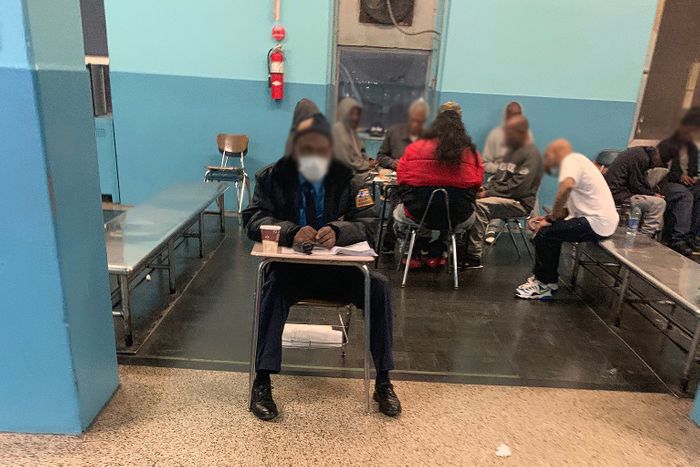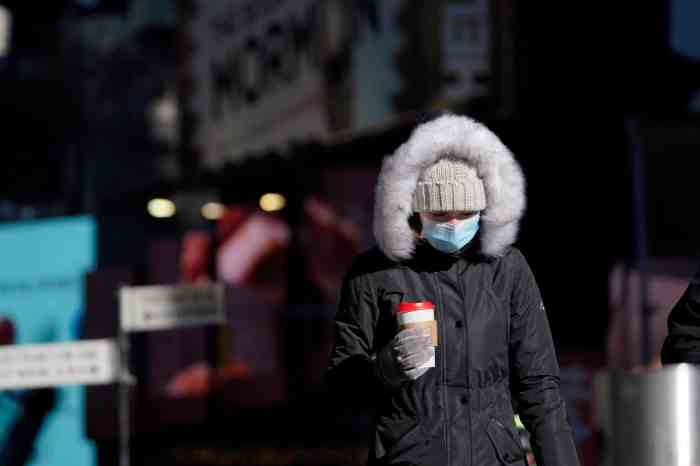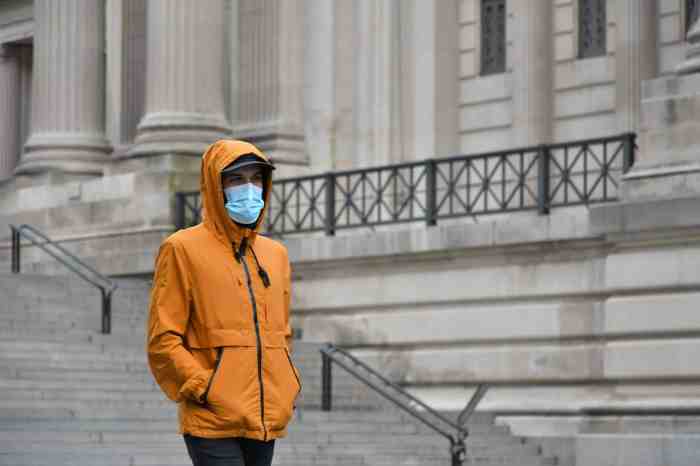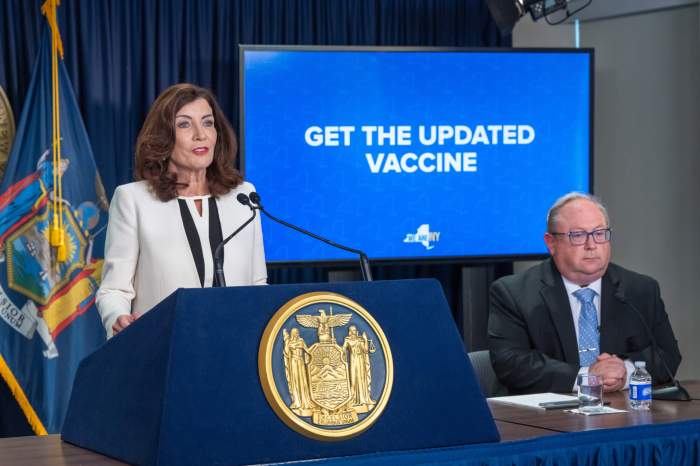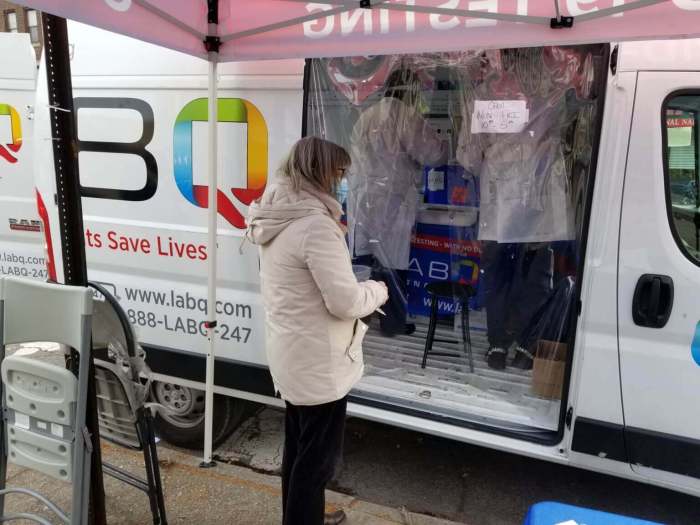By Greg B. Smith and Claudia Irizarry Aponte

This story was originally published on March 31, 2020 by THE CITY.
In a photo shot Monday, seven residents of the 30th Street Men’s Shelter — the city’s biggest refuge for homeless New Yorkers — sit clustered around a small cafeteria table.
Only one has a surgical mask — and it’s pulled below his chin.
A private security guard sitting nearby wears a pale blue surgical mask. The city Department of Homeless Services police officers assigned to 30th Street say they get no such masks. In fact, they say, no DHS police assigned to shelters across the city have been given masks or any other form of protective gear.
Meanwhile, a top manager at the 30th Street Men’s Shelter died this week after calling out sick last week. A DHS spokesperson told THE CITY Tuesday, the death “does not appear to be COVID-caused,” but is under investigation.
“There’s no quarantining of the place,” said Derek Jackson, director of law enforcement for Teamsters Local 237, which represents the DHS police. “They’re allowed to go in and out. That’s the scary thing. They’re telling people to stay at home. Why are they allowing the homeless to come and go?”

The crisis of coronavirus has taken hold inside New York City’s massive network of homeless shelters, which house 58,000 people across the five boroughs.
Inside, staff and residents alike face potentially dangerous conditions, living in close quarters that make social distancing nearly impossible.
Adding to the challenge: DHS has been taking in and isolating people who say they can’t go home “for reasons related to the COVID virus,” THE CITY has learned. That includes people who tested positive and were either kicked out of their homes or left to prevent infecting others.
Growing COVID-19 Cases
Confirmed infections of people with ties to the city shelter system are rising.
Nine Department of Homeless Services police have tested positive for the virus. More than a dozen more awaited test results as of Tuesday.
The number of New York City homeless who have tested positive for coronavirus had risen to 120 by Monday, encompassing more than 60 shelters across the city, according to DHS’ latest figures.
Four have died, and more than 150 who either have COVID-19 or are displaying symptoms have been moved into “isolation units” at hotels.
The units are described as “a closed room with a cot (if available)” with private bathrooms “if possible,” according to internal DHS protocols unveiled on Sunday and obtained by THE CITY.
“Transportation to an isolation facility may take time to coordinate,” warn the guidelines, which the agency sent to shelter providers.
The agency says it is “working closely” with public hospital officials to refer known COVID-19 patients with prior shelter history back to the shelter system, if they have nowhere else to go.
‘No Social Distancing’
The need to enforce social distancing and isolate those with the virus is a challenge systemwide. This is particularly true at the 850-bed 30th Street shelter, the entry point for single men into the system.
DHS staff and police assigned there say conditions are unsafe.
“They’re not keeping them six feet apart,” said Jackson. “The [residents] are eating lunch together. They are being served meals in groups. There’s no social distancing between these groups.”
Even before the virus struck, 30th Street was plagued by violence and chaos, with the shelter’s managers struggling to maintain order and residents — many struggling with mental health issues — often the victims.

Local 237 President Greg Floyd said his union last week visited a Brooklyn warehouse where masks were being stored and was told they weren’t available for DHS police because they were being saved for hospital workers.
He’s been complaining for days about this. Now that some of his members have tested positive — including five from one shelter on Wards Island — he is furious.
“The city and the mayor and the [DHS] commissioner considered them expendable,” Floyd said. “[The mayor] was willing to risk their lives and health for the sake of saving supplies for we don’t know who. Now our members are testing positive.”
Isaac McGinn, a DHS spokesperson, said the department and city government as a whole have had difficulty obtaining an adequate supply of face masks and other protective equipment.
“Hospitals where care and supplies are most urgently needed are our city’s priority at this time,” he said.
‘Risk of Spreading’
The lack of masks also has emerged at the “isolation” hotels where DHS has transferred shelter residents who’ve tested positive, residents who’ve had close contact with those who are infected, and residents who are elderly or have underlying medical issues and are showing symptoms.
As of Monday, 154 individuals were living in these isolation units at three sites, with more on the way.
Catherine Trapani of Homeless Services United, a nonprofit that’s been pressing for the use of hotels to help contain the virus’ spread, says DHS told the operators of the hotel isolation sites they would have to get their own masks “because the city doesn’t have any.”
She said they were promised thermometers to take the temperature of residents in isolation, but won’t be getting them for two weeks.
“We can’t even take their temperature because we don’t have thermometers,” Trapani said.
“People are being asked to work without equipment. We’re having a real hard time meeting the needs of our workforce and therefore of our clients. They’re not only at risk of catching the virus. They’re also at risk of spreading it.”
This story was originally published by THE CITY, an independent, nonprofit news organization dedicated to hard-hitting reporting that serves the people of New York.



